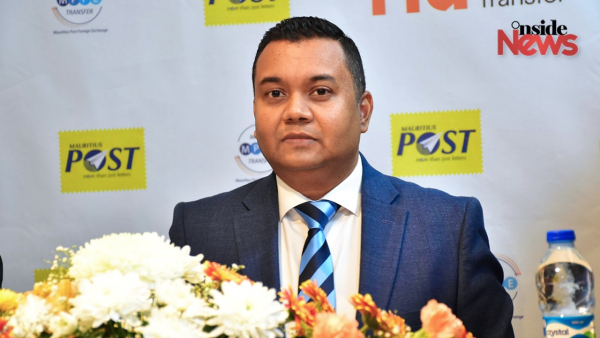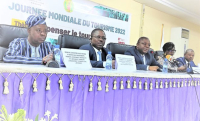Mauritius kicked off its digital transformation plan nearly four years ago. To successfully implement its programs in that light, it committed to finding strategic partners that will provide technical and financial support.
Mauritius and India recently agreed to collaborate on several digital projects. The two countries, represented respectively by the Ministry of Information Technology, Communication and Innovation, and the National Informatics Centre Services Incorporated (NICSI) signed a memorandum of cooperation to this effect on Friday, September 23.
Speaking on the merits of this partnership, Deepak Balgobin (photo), the Mauritian Minister of ICT, explained that it will allow the government to improve the dematerialization of several public services in various strategic areas such as health, education, trade, etc. Apart from the development of communication channels -for information exchange, the two parties will also collaborate “ on best practices in the use of IT in the Mauritian government,” said Minister Yogida Sawmynaden.
Mauritius made a strategic move by choosing India as its digital transformation partner. A few years ago, India signed tech cooperation partnerships with four African countries, including Mauritius. At the time, India committed to providing strong support for the development and scientific development of the four African partners.
The India-Mauritius cooperation has already yielded positive results. In 2003, India was heavily involved in the construction of the "Ebene Cybertower" also called Shri Atal Bihari Vajpayee Tower -since 2019- in honor of the former Indian Prime Minister. The tower, located 15 kilometers south of Port Louis, was designed and built by Indian companies. India also opened a US$100 million credit line for the project.
Samira Njoya
In Africa, money transfers are sometimes quite expensive, therefore impairing financial inclusion. To address the various reasons, a number of local startups are devising adapted solutions.
Eversend is a fintech solution developed by an eponymous Ugandan startup founded in 2017. It allows users -both individuals and businesses- to make affordable “borderless” money transfers.
“Eversend aims to be a solution to the “massive currency devaluation, high-interest rates, predatory pricing of up to 15 percent in hidden forex fees, inadequate payments infrastructure, and mediocre digital banking experiences,” says Stone Atwine, co-founder of the startup which went live in 2019.
To successfully carry out its mission, the fintech solution has a mobile app (accessible on Android and iOS devices). The services accessible on the mobile app include money transfer, currency exchange, virtual debit cards, or stock trading. Its stock trading feature allows access to US stocks from the Eversend interface. It also allows businesses to make multi-currency payments.
Currently, Eversend claims more than 350,000 happy clients. According to Stone Atwine, the volume of transfers it processed rose to US$230 million, up from US$5 million in 2020 and US$800,000 in 2019.
“We hit our goal of sustainability last year, and we are entering our growth and expansion phase in 2022,” the co-founder said.
The Ugandan startup is among the 60 beneficiaries of the second cohort of the Google for Startups Black Founders Fund, which entitles participants to a slice of US$4 million in financial support. The startup is already operational in Uganda, Kenya, Nigeria, Rwanda, and Ghana. It also plans to scale in French-speaking Africa, Europe, and the USA.
Adoni Conrad Quenum
After his higher education in Germany, he moved back to his native country to improve the quality of mobility offerings. He specifically focused on an industry crowded with amateurs: motorcycle taxis.
Patrick Timani (photo) is a Cameroonian embedded system engineer and tech entrepreneur. In 2015, he graduated from the University of Pforzheim, in Germany. He also holds a microfinance expert certification from the Frankfurt School of Finance and Management.
In 2017, he co-founded BeeGroup, a mobility startup he currently heads as the chief executive officer. His startup offers two services through its mobile app (available for Android and iOS devices).
The first service is Bee Delivery, which facilitates last-mile delivery. It covers the logistics chain and makes short, medium, and long-distance delivery with its trucks, gaining the confidence of several national and international companies in Cameroon.
The second service, which sets Patrick Timani apart in the local startup ecosystem, is Bee Moto, a motorcycle-hailing service. On its website, BeeGroup explains that Bee Moto aims to formalize the motorcycle taxi industry in French-speaking Africa.
“Motorcycle is one of the most popular modes of transport in Cameroon and other French-speaking countries, but the motorcycle transport sector is not organized. We believe that we can make a big change by offering a new, modern service that would make motorcycle transport convenient and comfortable. We are pleased to partner with Yango, an international service, to give all Cameroonians the opportunity to arrive at their destinations on time and safely,” Patrick indicated in August 2022, when signing a partnership agreement with mobility startup Yango, in Douala.
In 2020, Bee signed a partnership agreement with Baloon Insurance. It thus became the agent in charge of delivering insurance certificates to Baloon Insurance clients. In early September 2022, it secured a contract with OneAllSports - Cameroon’s national football team’s new equipment manufacturer- becoming the official dealer of OnAllSports products in Cameroon.
In June 2022, after a successful experience in Cameroon, where the mobility start-up is becoming more attractive by the day, it launched its activities in the Democratic Republic of Congo.
Before his Bee Group experience, Patrick Timani honed his skills working for renowned companies. In 2013, he completed a one-year internship at the German energy company Siemens. The following year, he worked as an intern at the optronics, system technologies, and image exploitation application development company Fraunhofer IOSB. His startup is among the 60 beneficiaries of the 2022 Google for Startups Black Founders Fund.
Melchior Koba
The solution aims to help companies get ahead of the competition and boost sales.
Solutech is a digital solution developed by a Kenyan eponymous startup founded in 2014. It helps users -merchants namely- boost sales.
"With stiff competition and the need for route-to-market strategies by FMCG companies in Kenya, the struggle to make day-to-day strategic decisions has always remained a huge concern to manufacturers and distributors. They regularly lack timely and accurate distribution data, visibility of field sales activities and inefficiencies due to the traditional manual recording of activities and the nature of the fragmented retail industry in Africa,” Solutech co-founder and CEO Alexander Odhiambo (photo, left) told Disrupt Africa.
Solutech was founded to address all those issues and become the choice automation partner in the African sales and distribution sector. It developed a mobile app (available for Android and iOS users), which sends real-time notifications on the operations of registered merchants. It collects relevant information, informing its clients’ decisions. Its data also help improve sales management, logistics, and promotions aimed at helping merchants attract more buyers.
"With Solutech, companies have been able to witness increased productivity, a reduction of operational costs, and increased revenue through access to timely, accurate, and relevant customer insights," Alexander indicates. The start-up claims 4,000 daily users, over US$750 million in sales, and over 60 customers.
Solutech operates in Kenya, Uganda, Tanzania, Rwanda, Zambia, DRC, Ethiopia, and Sudan. This year, it is one of the 60 startups that will participate in the Google for Startups Black Founders Fund.
Adoni Conrad Quenum
The new funding secured six months after the agritech startup's last financing round brings the total funds it raised to US$14.4 million, including US$6.5 million in debt financing.
Ghanaian agritech startup Farmerline announced, Tuesday (September 27), the second close of its Pre-Series A investment raise. During that round, it raised US$1.5 million from social impact investor Oikocredit.
According to Farmerline co-founder and CEO, Alloysius Attah, the round will help support farmers and agribusinesses across Africa in a context marked by the war in Ukraine. “With the support of Oikocredit alongside our first-round funders, our distribution, logistics, and financing services will continue not only in Ghana but also in Côte d’Ivoire where we’ve recently begun the process of expanding our team,” he said.
West Africa was recovering from the coronavirus pandemic when the Ukraine war began. Record inflationary pressures ensued, sending the cost of living flying in most African countries. According to Issoufou Baoua, an expert food security analyst with the Inter-State Committee for Drought Control in the Sahel (CILSS), the number of people threatened by food insecurity in the Sahel and West Africa is rising. “We have gone from 10.7 million people threatened by food insecurity in 2019 to 40.7 million in 2022,” he says.
By expanding its African footprint, Farmerline will strengthen its agribusiness supply chain, cut costs for farmers and boost yield with the deployment of AI solutions and local infrastructure.
The startup, founded in 2013, currently claims about US$18 million worth of inputs and crops financed so far by franchising with agribusinesses and input resellers. The startup now aims to reach 300,000 farmers by 2022, a nearly 400% growth from last year, when it doubled its direct reach to 79,000 farmers (from 36,000 in 2020 and 8,000 in 2019).
Samira Njoya
The Covid-19 pandemic has changed consumption habits in Africa, making e-commerce platforms more popular.
Club Tiossane is an e-commerce platform developed by Senegalese dairy company La Laiterie du Berger. It allows clients -notably those living in large towns- access to fresh products. During the coronavirus pandemic, the solution, which was formerly known as Club Kossam, saw a huge jump in its operations.
For its manager, Lucien Diedhiou, Club Tiossane is getting more popular by the day because of the new consumption habits. According to the manager, as both men and women are now working, the need for such e-commerce services will rise.
The solution is accessible only through a web portal and on social media. Users who want to buy fresh products through the web portal need to register an account. Clients can order the products they need for the following week and state a delivery timeframe and payment means (they can pay in advance or pay on delivery). Let’s note that the company delivers to its clients free of charge.
In 2020, it delivered 1,300 households in Dakar. It claims an average of XOF30 million (about US$44,500) monthly income and 62 million lives touched in April 2020. This year, it is among the 43 African startups that will participate in the Social & Inclusive Business Camp sponsored by the French Development Agency.
Adoni Conrad Quenum
After nine years in the banking and finance sector, he made a U-turn, in 2017, to develop his passion for new technologies. In partnership with various partners, he invested in artificial intelligence, earning several awards.
Youssef Bouyakhf is a Moroccan tech entrepreneur and co-founder of DeepEcho, a medical imaging startup.
Through DeepEcho -founded in 2020, Youssef combats infant and maternal maternity with a prenatal diagnosis solution that helps prevent potential pregnancy complications and reduce diagnostic errors. Thanks to high-performance deep learning algorithms, the solution makes ultrasound scans simpler yet more accurate.
"DeepEcho is a deep tech startup that focuses on the fourth Millennium Development Goal of reducing child mortality. We come from AI Lab and we work hand in hand with the best doctors in Morocco," Youssef Bouyakhf told Plug and Play in February 2022.
The tech enthusiast is particularly attracted by artificial intelligence given its usefulness in practical applications. In 2020, he co-founded Akumen IA, a consulting firm leveraging tech and data science to meet firms' and institutions’ needs. Three years earlier, he co-founded AIOX Labs, a Morocco-based start-up studio that uses data science and artificial intelligence to address businesses’ needs.
Before going into entrepreneurship full-time, Youssef worked for national and international institutions. His professional career started in 2009 when he was hired, as an audit intern, by the accounting firm Ernst & Young. Months later, he became an assistant Director of Marketing and Communication for the construction company Garanti Koza. In 2011, he joined BNP Paribas as a Business Analyst Intern in the structured debt department.
The following year, JP Morgan hired him as an Investment Banking Summer Analyst. Between 2015 and 2017, he was a principal investing associate for the financial services group Macquarie Group. Then, his growing interest in artificial intelligence pushed him to start side projects.
Thanks to DeepEcho, he is among the three winners of the 2022 Orange Social Venture Prize in Africa and the Middle East (POESAM). He is also one of the nominees for the Aviram Awards-Tech for Humanity 2022, a competition launched by the Aviram Family Foundation in partnership with Forbes. In September 2022, DeepEcho was selected for the pan-African program “Investing in Innovation,” funded by the Bill and Melinda Gates Foundation.
Melchior Koba
In 2020, the tourism sector was hit hard by the coronavirus pandemic worldwide. Amid the wave of accelerated transformation that ensued, countries, like Togo, are multiplying actions to revive the sector and make it a better instrument in their fight against poverty.
Togolese Minister of Tourism, Dr. Gbenyo Lamadokou (photo, center), inaugurated, Tuesday (September 27), the new national platform dedicated to the promotion of the tourism sector in Togo. The platform, called Togo Tourism, was inaugurated at the University of Lome, on the sidelines of the 42nd World Tourism Day.
According to Dr. Gbenyon Lamadokou, this new portal is of great importance, because it will revive the tourism sector, which was greatly affected by the coronavirus pandemic. On Monday, September 26, the Ministry of Tourism published figures showing a 49.1% year-to-year decline in tourist arrivals in Togo in 2020. According to the figures in 2020, the country recorded 481,706 tourists against 946,376 in 2019.
The figures nevertheless show a gradual recovery. Indeed, from XOF19 billion in 2020, the revenues generated by the sector rose 34%, to XOF25 billion in 2021. For Dr. Gbenyon Lamadokou, the rise was due to a “gradual deployment of the Covid-19 vaccine, the adoption of several measures, and the easing of travel restrictions.”
The new platform aims to attract even more tourists to the country. It presents the country’s cultural and tourist potential and lists the 10 reasons why visitors should visit Togo. It is part of the national strategy to attract 500,000 tourists to Togo annually and raise the contribution of the tourism sector to 6.2% of GDP by 2025.
Samira Njoya
Niger has the highest fertility rate in the world. Meeting the food needs of this rapidly growing population is a challenge for the government, organizations, and actors in the agricultural sector.
Last Tuesday, the Digital Development Agency (ADN) and the Swiss Foundation for Technical Cooperation, Swisscontact, launched an integrated digital platform in Niamey. The platform, baptized AgriShop/Rayuwa, aims to improve the skills of the various actors in the agricultural ecosystem in Niger, but also to facilitate their access to agriculture data and information.
According to ADN CEO, Wahidi Rabiou, the AgriShop/Rayuwa platform has three components. They are namely an e-commerce feature to connect farmers with potential clients and fellow farmers, an assistance feature to advise farmers, and an information feature to inform and train them.
Agriculture plays a very important role in Niger's economy. According to the United Nations Office for Project Services (UNOPS), it accounts for nearly 40% of the country’s GDP and provides livelihoods to more than 80% of the rural population. However, farmers sometimes lack the right information on seed techniques. They sometimes don’t even have loyal customers to quickly sell their products.
The e-commerce feature, Agrishop, will correct these shortcomings by offering farmers the possibility to list their products for sale. It targets "cooperatives, input or seed suppliers, individual or professional buyers, agribusinesses, agritech and also farmers, transporters, and marketers,” Wahidi Rabiou explains.
The platform can be used even without an internet connection. Thanks to a dedicated USSD code, farmers can receive information and advice via SMS messages. They can also receive remote assistance.
The project also includes an interactive voice server accessible through a short code allowing users to listen to pre-recorded messages on useful information, and agricultural advice in French, Hausa, Zarma, and many other languages.
The development of this “groundbreaking” platform is part of two programs implemented by Swisscontact. The first program is the Promel (Local entrepreneurship promotion program) financed by the Swiss Cooperation and the PEMIJ (Promotion of youth employment and labor market integration) financed by the Dutch Embassy.
Samira Njoya
In recent years, the number of startups created in Africa has risen significantly. Those ventures develop solutions to address various challenges facing residents.
VetCode is a digital solution developed by an eponymous Egyptian startup founded in 2018. It enables users to book pet grooming, obedience, behavioral and veterinary services remotely.
Its services can be booked via its web platform, by calling a dedicated number, or via its mobile app (available for Android and iOS devices). The startup behind VetCode is partnered with several vet clinics. In case of emergency, its clients can visit the nearest clinic in its network or even request a vet to visit them at home.
VetCode also has a pet store where customers can buy, sell or adopt a pet. Currently, it operates in a dozen Egyptian cities, with hopes to enter new markets in the coming years. To fulfill its ambitions, it has already raised more than US$450,000 since its inception.
Adoni Conrad Quenum
More...
In Africa, access to quality healthcare still proves challenging for many residents. To address the situation, tech entrepreneurs are developing solutions to complement government initiatives.
Damu-Sasa is an e-health solution developed by a Kenyan startup Damu Sasa System Limited (DSL), founded in 2017. It supports blood supply, inventory, and transfusion management. It also helps improve haemovigilance.
To easily create its blood bank database, the solution has an Android app, allowing donors to join an e-community of blood donors and discuss with them through the chat feature.
Through the app, donors can access their blood donation records and check whether a blood donation appointment is scheduled. Thanks to that approach, Damu-Sasa can supply blood to hospitals, even in case of emergency. Currently, it claims a database of 44,527 donors in 38 counties, 34,161 lives touched and 179 hospitals supported.
In 2020, during the coronavirus pandemic, it received a US$20,000 grant from Villgro Africa, an incubator and impact investor operating in the health sector, to enhance its capabilities. At the time, DSL chairman, Matunda Nuancham explained that the funding would help “improve potential blood donor numbers and hence help alleviate, to the degree possible, the perennial blood shortages.”
In June 2022, the University of Nairobi announced a partnership with DSL for a project aimed at improving the management of blood transfusion services in Kenya. Months later, in September, DSL made it to the list of the 30 African healthtech startups to participate in the first cohort of the i3 innovation program sponsored by several foundations, including the Bill and Melinda Gates Foundation.
Adoni Conrad Quenum
In Africa, the volume of funds attracted by fintech startups is growing rapidly. Those startups come up with alternative solutions to address some of the pressing challenges faced by businesses and individuals.
myStash is a fintech solution developed by an eponymous Nigerian startup, founded in 2021. It automatizes the savings process, allowing users to save a preset percentage of their earnings and expenses.
Through its web and mobile apps (the mobile app is available for Android and iPhone users), users can manage their finances and set the percentage of expenses and earnings to save. To do that, they must first register by providing personal information, then link their bank cards to their myStash accounts.
The startup assures that the process is secure and it has no access to sensitive information. On its website, it claims that it has helped over 25,000 customers and hundreds of businesses “make better money moves by helping them save bit by bit in Naira or Dollars.”
The startup also offers a 5-12% interest on the amounts saved. In addition, it enables users to receive part of their salaries in US dollars. Its services are free. This year, it is among the 43 African startups selected for the Social and Business Camp sponsored by the French Development Agency to help startups get themselves known to potential investors for their growth.
Adoni Conrad Quenum
The 2-year program launched by Southbridge A&I and its partners aims to uncover homegrown innovations that have the potential to change the way healthcare supply chains and systems work.
On Monday, Sept. 26, Investing in Innovation Africa unveiled the list of 30 African startups selected for the first cohort of the Investing in Innovation (i3) program.
The selected startups include seven Nigerians, five Kenyans, three South Africans, three Moroccans, two Zimbabweans, two Ugandans, one Cameroonian, one Angolan, one Congolese, one Ivorian, one Ghanaian, one Rwandan, one Senegalese, and one Tunisian.
All of them are in the start-up or growth phase and offer innovative solutions for the distribution of medicines and medical equipment, stock management and financing, authentication, traceability, and medical waste management. They will each receive a US$50,000 grant and support to catalyze growth-oriented partnerships with donors, industry leaders, and institutions. Their market access will also be improved with the various events they will attend throughout the year.
According to Efosa Ojomo, member of the i3 Steering Committee, “i3’s focus on African ingenuity is long overdue – supporting locally-led, market-creating innovations to scale will equip the continent to achieve health gains, generate prosperity and weather future crises.”
Samira Njoya
The difficulties in accessing traditional banking services have motivated African entrepreneurs to develop a multitude of fintech solutions to help both individuals and businesses.
Paiement Pro is a fintech solution developed by Ivorian start-up Amira Global Technologies, founded in 2019. It allows users to collect or issue mobile money and credit card payments online. It also helps them develop their online businesses.
Apart from its web platform, the solution also has an Android app allowing users to register an account by providing a set of information, including name, contact details, geographic location, etc. The startup will later dispatch a sales representative to check users’ activities. After registration, users can access all the features required to set up their online payment or issue payments.
The solution integrates several plugins such as Pro Shop, Pro Agenda, Pro Event, etc. To enable seamless performance, each of the plugins has dedicated features like the QR Code scanner that allows users to authenticate tickets sold using the Event Pro plugin.
To facilitate the processing of transactions carried out via its platform, Amira Global Technologies has partnered with the United Bank of Africa (UBA), mobile operators, Visa and Mastercard. Currently, it operates in Côte d’Ivoire, Benin, Burkina Faso, Niger, Mali, and Senegal. It also eyes the Cameroonian, Congolese, DR Congo, Ghanaian, Nigerian and Togolese markets.
In 2021, it received the National Award for the Women's Digital Initiative of the Year. It was also among the top 50 finalists of the Africa’s Business Heroes competition. This year, the startup is also one of the 43 African start-ups selected for the Social & Inclusive Business Camp sponsored by the French Development Agency.
Adoni Conrad Quenum















